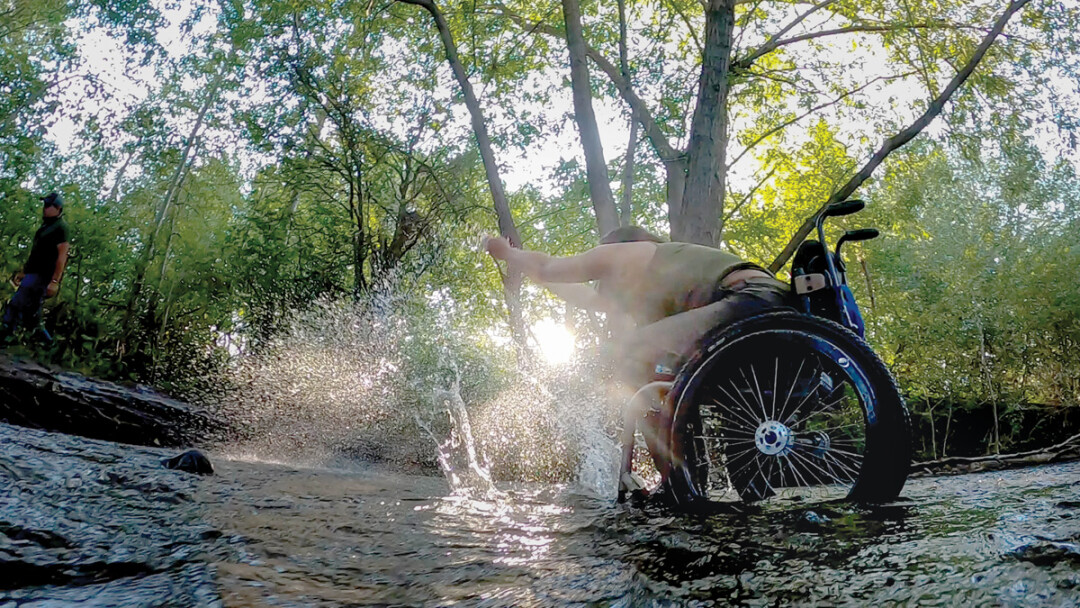Up The Theatrical Creek
Kevin Brustuen | Thursday Oct. 1st, 2020

In mid-June of this year, I was walking along the East Gallatin River one afternoon when I saw a fascinating sight:
A young man named Jacques, dressed in white and holding his flute as he sat beside the East Gallatin River in Bozeman, looked up at a small group of people walking down the path towards him. He paused a moment, absentmindedly fingered his flute while he pondered who these people were and what they wanted. Seeing they came to see him, he sighed, stood up and addressed the waiting group with the words:
“All the world’s a stage,
And all the men and women merely players;
They have their exits and their entrance,
And one man in his time plays many parts…”
After delivering the rest of this famous monologue known as “The Seven Ages of Man” from Shakespeare’s As You Like It, accompanied by the sound of rushing river water, he ended his delivery with the last lines:
“Last scene of all
That ends this strange eventful history
Is second childishness and mere oblivion,
Sans teeth, sans eyes, sans taste, sans
everything,”
Jacques slowly walked down the path paralleling the river, beckoning the people to follow him by playing a slow melancholic dirge timed to the slow shuffling of their feet to a nearby bridge, where, stepping to the side, he gestured the people onwards, saying to them as they went by, “There lies your way, due west.” And the people obeyed, as they went on to participate in Montana InSite Theatre’s production of Shakespeare’s Walking Story in Story Mill Park. This was a site-specific outdoor performance designed to allow Coronavirus-weary people a safe opportunity to experience live theatre once again.
The setting was a nature walk along a river in Bozeman. Six actors, strategically placed at six locations along the forty-minute walk, put a safe distance between each of the small groups of ten who were guided along their walk by other actors. The theme was “Prisons,” reflecting upon real and metaphorical prisons people make for themselves, all in the immediacy of coronavirus and the disquieting political times. Each actor delivered a monologue selected for its applicability to the theme and the local environment. One monologue was accompanied by original music set to Shakespeare’s words, as had been done in Shakespeare’s own time. Audience members quickly understood the connections to their own life experiences through the lens of Shakespeare’s words from 400 years earlier, and the not dissimilar circumstances which humans lived through at the time the words were originally written. The audience reactions to Shakespeare’s Walking Story proved that the performance met the pent-up need of the Bozeman community to experience live theatre once again, and especially a production that spoke to their often-unexpressed emotions during the time of pandemic.
The darkened theaters have left a hole in human need not only for entertainment, but even more importantly, for the experience with others in a place of shared emotions, of insightful performances shedding light on the human condition. We hunger for art, and especially for art which expresses the frustrations of a people, assuring them they are not alone in their thoughts, hopes, and fears.
Montana InSite Theatre (MIST) was founded to meet the needs of these turbulent times by providing opportunities for people to experience theatre outside of large indoor auditoriums, using site-specific locations. Concentrating on current issues, often using classic texts, MIST offers theatre-goers opportunities to experience theatre in safe environments.
As MIST’s Gretchen Minton says, “We are committed to being an umbrella organization that can serve as a collective of experienced performance artists who are passionate about using classical texts to evoke insights, often on unusual stages and locations.
Since its founding in 2019, MIST has produced two staged plays (Timon of Anaconda and Shakespeare’s Walking Stories, and one film (Oguta Island). The next production will be a winter-time outdoor theatre experience called Sonnets in the Snow.
Oguta Island, a film set in colonial Nigeria, explores the impact of the cancer of colonialism. Based on Shakespeare’s The Tempest, Oguta Island was written by Nnamdi Kanaga, a filmmaker who grew up in Nigeria and wanted to document the environmental damage that colonialism brought to the dominated countries. Kanaga’s adaption leads one to also consider an additional manifestation of the remaining artifacts of colonialism: the systemic racism that yet endures in our society. This film was selected by the Bozeman International Film Festival for the signal honor of having an in-person film screening. Oguta Island is now transformed into a live stage production, scheduled to be performed publicly outdoors in October.
Another company in Bozeman was created in 2016 with a mission to address environmental issues through art, offering performances in outdoor settings: Mountain Time Arts (MTA) has a special focus on water and art. Their mission statement includes “Mountain Time Arts produces inventive public art projects that “enliven our relationships to the history, culture and environment of the Rocky Mountain West. We cultivate relationships between artists, scholars and community members to conduct research and produce artworks about critical issues in Southwest Montana. MTA is committed to social and environmental justice.”
MTA’s co-founder Jim Madden explains a major principle: “Mountain Time Arts understands that issues of environmental and social justice are deeply intertwined; we must actively seek solutions for both in order to ensure a just and sustainable future for our world and communities. We believe art communicates what words and numbers simply cannot. By employing authentic collaboration in the generation of our projects, non-artists get to experience producing art with us. The resultant presentations touch audiences on a visceral level; the art itself can evoke questions, encourage observations, and spark introspections that lead to deeper connections to place and act as a catalyst for change.”
MTA produced Flow as one of its first projects, revealing a sophisticated use of video, architecture, music and live performance in their production at Story Mill Grain Elevators. In 2019, they introduced a new series, entitled Standby Snow: Chronicles of a Heatwave. Chapter One of Snow premiered last summer; Chapter Two of Snow is planned for 2021. This series is a very timely look at climate change, drought, fire and resilience in the Rocky Mountain West.
Standby Snow is a great example of their mission in action, as they believe art helps people understand science, culture, and the history of climate change; once audience members understand, it’s easier for them to make the necessary changes in their lives to change our environment for the better. To accomplish these ends, MTA has engaged well known artists along with local ranchers, environmentalists, scientists, Native Americans and politicians to learn, perform, and teach about our region’s water systems and, more importantly, open critical conversations with each other and audience members.
On August 28, I walked along the Bozeman Creek trail heading north from Tuckerman Park, following Shane Doyle, a member of the Apsaalooke (Crow) tribe serving as a guide, playing a native American song as he led us to a site alongside the Bozeman Creek. As the small group I was part of stood under trees on the bank of the creek and watched, two actresses in trees overhanging the creek and one actress in the water itself used motions and their presence to focus our attention on the connection between humans and the creek, helping us understand that our well-being as humans is interconnected with the health of the creek and its environment. Mountain Time Arts had developed this show, The Creek Between Us, to challenge people to look at nature in a new way, a way that will help us remember that we, too, are part of nature, and need to care for our environment, a beautiful marriage of history, environment, and performing arts. As I watched, listened, and learned from these actors moving in and over the creek, I realized I was watching a performance in the same waters that I had watched Shakespeare’s Walking Story several months earlier, just higher upstream. The streams of water – and theatre— have connected, and Bozeman is no longer up a creek without a theatre.
For more information about Montana InSite Theatre, upcoming events, and to watch Oguta Island (free) please go to its website at https://www.montanainsitetheatre.org.
For more information about Mountain Time Arts, please visit its website at https://mountaintimearts.org
| Tweet |
